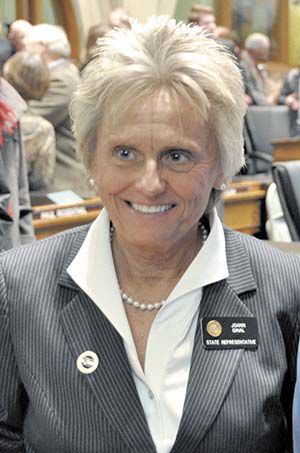Should terminally ill patients be able to end their own lives?

An interview with Rep. Joann Ginal, D-Fort Collins
“A bill of choice.” That is how state Rep. Joann Ginal, D-Fort Collins, describes the bill she is introducing this session with co-sponsor Rep. Lois Court, D-Denver, concerning the ability of a terminally ill individual to make end of life decisions. Currently, four states have passed similar bills including Montana, Oregon, Vermont and Washington. Ginal says that her bill is modeled after Oregon’s 20-year-old law that makes it legal for a terminally ill patient to self-administer a life-ending dose of prescribed medication.
She says she was motivated to bring the bill by constituents’ requests and by her own personal experience with the deaths of her father and brother. Her inspiration to bring the bill, she adds, was the act of 29-year-old Brittany Maynard who, suffering from brain cancer, moved from California to Oregon last year to legally end her life under that state’s law.
Following this interview is a second one conducted by Strode with state Sen. Kevin Lundberg, who opposes such a bill.“
What kind of requests have your constituents made to motivate you to bring this bill? “They just want the option to be able to choose a death with dignity instead of the pain and the suffering they know they’re going to endure in the last few days of their lives. To be able to end their life the way they would like to, with their family around them, and in their own home. However they want to end their lives, their choice of how they want to do this, knowing they don’t have very long to live, they would like to end it as one of their life choices. That’s basically what they’re saying.”
Why did you choose Oregon’s law as a model for your bill? “The Oregon bill has been in effect since 1994. There is a lot of data and statistics [to consider]: who’s taken it, how many prescriptions were written, how many prescriptions were actually filled. We’ve got 20 years of data that we can utilize to look at the success of the bill in Oregon. There are a lot of metrics they go by: what’s the age of the patient that has applied for the medication, what types of illnesses, the numbers of males and females, what’s the demographic of it… Over the 20 years the Oregon law has been effect, the majority of people using it have been in their 70s and suffering from cancer or heart disease. Now there are younger people with terminal illness that are starting to think of it. Brittany Maynard was one.”
What is in the bill to determine who would administer medication? “Only the patient can initiate the request and only the patient can self-administer the medication. Terminal illness means that a person is suffering from an irreversible illness that is likely to result in death in six months. Only competent, terminally ill adults are eligible. In addition to the patient’s request, four other individuals — two physicians and two witnesses, must be convinced the patient is making a fully informed decision and is not acting under duress or compulsion. I have to say, and I want to clarify this, it’s not a suicide. These people do not want to commit suicide. They want to live just as much as you and I do. They just know they’re at the end of a very hard struggle.”
What do you hope the result of this bill will be? “I hope that my colleagues, on either side of the aisle, see this bill as a choice that a person has if they’re terminally ill — how they wish to end their life. We have choices all along the path, from the beginning to the end, and this is one of the end choices we have with our life. It should be respected if that is what someone chooses. These are terminally ill patients. They’re not patients that have a long-term illness but aren’t terminal. These patients know they don’t have a lot of time left. They know their last few days are going to be extremely painful. A lot of people will get this prescription and about half of them won’t even fill it. I think it’s more of a comfort level; that you have control. If you need to use this prescription, it’s there for you. I think it’s an important bill. I think it’s a bill of choice.’”
Several states are in the process of introducing similar bills. Do you think there’s a ‘Death with Dignity’ movement underway? “I think a lot more people are thinking about their end of life decisions. For as long as I can remember, we haven’t talked about death with our families, with our friends. It has been a taboo subject. But I think it’s part of our lives. If it [the bill] does anything, it gets us talking about an issue that we all really need to address.”
An interview with Sen. Kevin Lundberg, R-Berthoud
By Catherine StrodePolicy Outreach Specialist with Advocacy Denver
“A moral wrong.” That is how state Sen. Kevin Lundberg, R-Berthoud, chair of the Senate’s Health and Human Services Committee, describes the bill being sponsored by Reps. Joann Ginal and Lois Court. He says the legislation, concerning the ability of a terminally ill individual to make end of life decisions, poses a moral dilemma for doctors.
What is your perspective on the bill sponsored by Representatives Joann Ginal and Lois Court? “I think it’s inappropriate because what it really does, is, it tells doctors you can prescribe a lethal dose of drugs. That flies in the face of what a doctor is all about. Secondly, it puts a lot of doctors really in a significant moral dilemma. We’ve already dealt with the issue of palliative care. We passed a bill a couple of years ago that defined where the line should be drawn. I remember working on that with the bill sponsors because initially their language really put a very gray area as to whether the doctor was prescribing enough medication that would end somebody’s life or would simply relieve the pain they have in those final days of their life. I worked with them and we made it clear that the doctor is not prescribing a dose to be lethal but, it’s a dose to relieve pain. Now, this, quote, ‘right to die’ bill is all about a doctor’s ability, or legal authority, to cross over that line and to say, ‘Yeah take this, and you’ll be gone.’”
The point is made that it is not physician administered. Does that change your viewpoint? “They say it’s patient-administered but it’s really dealing with the doctor’s authority to prescribe a lethal dose of something. For all they say, it has to do with the doctor/patient relationship crossing over from just ‘doing no harm’ to ending one’s life. There’s a moral line that I believe is very clear and most everyone I talk with understands that as well. I recognize that some states have jumped off that cliff but I don’t believe we should. This has come up several times. A lot of people have come up to me and say, ‘Don’t do it. Just don’t do it.’ The understanding is this is a moral wrong that we are authorizing doctors to engage in.”
What is your opinion on the sponsors’ belief that the patient should have the right in their final moments to choose life or death? “Quite frankly, any individual if they choose to end their life takes on that responsibility themselves. There’s no way we can do anything about it. Again, this is a bill that authorizes a doctor to get involved in this act of suicide. I don’t believe the state of Colorado should authorize that in any way. I believe we should address palliative care. I’m defining palliative care as providing enough pain medication to relieve a patient who is suffering from a terminal disease sufficient quantities of the pain medication to deal with that pain. This is, qualitatively, a different issue, which is wrong, and I don’t support it.”
You may debate this bill in your Health and Human Services Committee. As chair of the Committee, what kinds of initiatives will you be supporting this session? “This ‘one size fits all’ notion in medical care and much of our social services is not the best choice, particularly when it comes to implementing Obamacare. That is, you might say, job number one: to get rid of that coercive system. It’s centralized management of medical care. We’ve got to move back to the doctor/patient relationship and put that within the context of free market mechanisms. I’ll be supporting bills that do promote competition, that put people back in charge of their lives rather than the government systems.”
Wouldn’t some say that is what this proposed bill concerning the right of terminally ill patients to make end of life decisions does? Putting people back in control of their own health? “I’ll go back to the discussion we had. That particular bill is authorizing a doctor to prescribe a lethal dose of drugs. That, I do not believe, is within the purview of the government to be condoning in any way. I’ll point out that some states, like Oregon, went and put it as a funded medical procedure. In other words, in Oregon they didn’t just say, ‘You can do it.’ They said, ‘And here’s the money.’ I think that’s going to happen in Colorado, too. Now, we’re not just allowing somebody to do something that they think is right. We’re allowing a doctor to participate within the realm of what’s allowed and not allowed for medical procedures.”
Colorado Politics Must-Reads:














